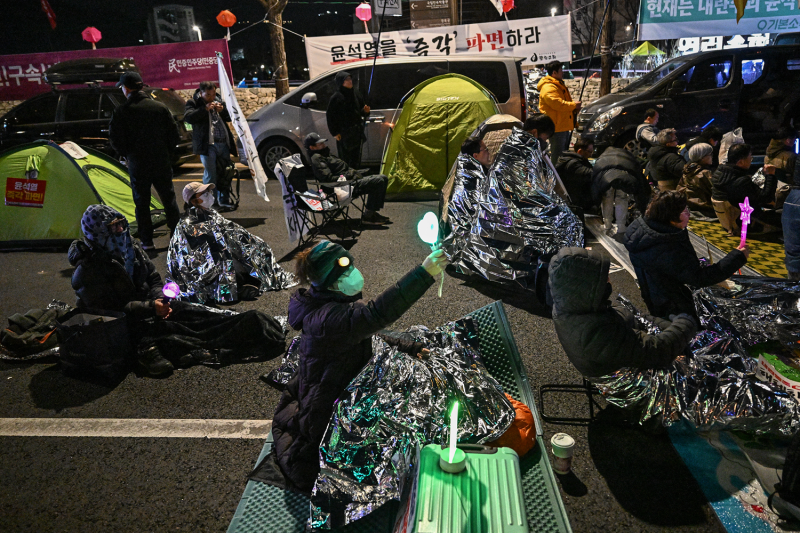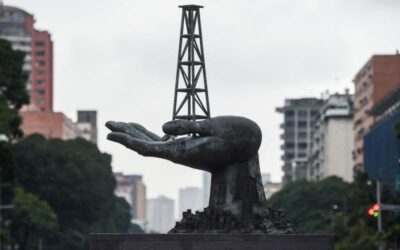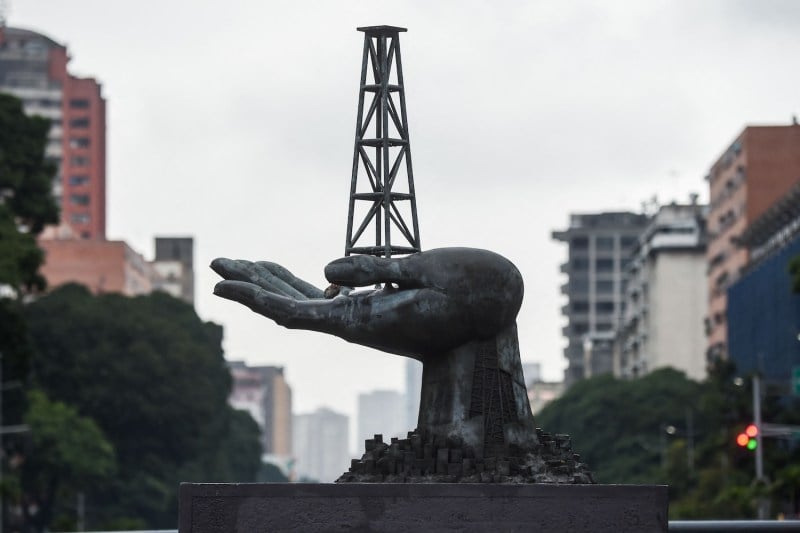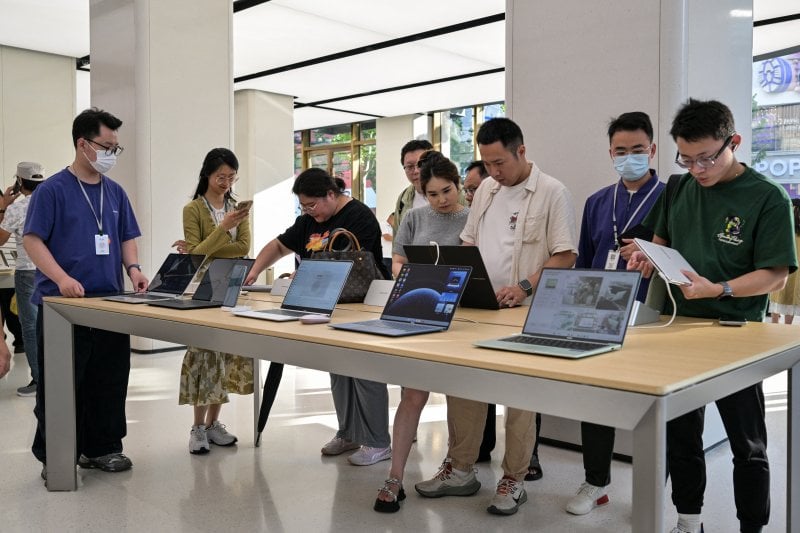South Korea’s Top Court Is Producing a Revolving Door Presidency

South Korea’s Top Court Is Producing a Revolving Door Presidency
A key U.S. ally has a leadership power vacuum.
People take part in a vigil against impeached South Korean President Yoon Suk-yeol near the entrance of the Constitutional Court in Seoul on April 3. Pedro Pardo/AFP via Getty Images
In the latest twist to South Korea’s deepening political crisis, the Constitutional Court, the highest legal authority alongside the Supreme Court, reinstated Prime Minister Han Duck-soo as acting president, overturning his impeachment by the National Assembly last December. The court’s ruling on March 24 marked just one of a series of decisions that will chart the future of South Korea’s democracy, including the landmark decision this Friday on whether to dismiss or reinstate President Yoon Suk-yeol, who was impeached by the National Assembly on Dec. 14 after his failed declaration of martial law plunged the country into turmoil and left its leadership in limbo.
The overdue ruling, which was originally expected in March, is one that the deeply polarized country awaits with anxiety, amid growing partisan fractures and a prolonged power vacuum—and one that could have far-reaching consequences for the United States’ alliance with a key partner.
In the latest twist to South Korea’s deepening political crisis, the Constitutional Court, the highest legal authority alongside the Supreme Court, reinstated Prime Minister Han Duck-soo as acting president, overturning his impeachment by the National Assembly last December. The court’s ruling on March 24 marked just one of a series of decisions that will chart the future of South Korea’s democracy, including the landmark decision this Friday on whether to dismiss or reinstate President Yoon Suk-yeol, who was impeached by the National Assembly on Dec. 14 after his failed declaration of martial law plunged the country into turmoil and left its leadership in limbo.
The overdue ruling, which was originally expected in March, is one that the deeply polarized country awaits with anxiety, amid growing partisan fractures and a prolonged power vacuum—and one that could have far-reaching consequences for the United States’ alliance with a key partner.
Since Yoon was impeached over his failed self-coup, South Korea’s leadership has been filled by a revolving door of acting presidents from his cabinet eager to pave the path for his return to power. First came Han, a veteran career bureaucrat who has held various government positions for both liberal and conservative administrations since the 1970s, most recently as prime minister under Yoon.
Soon after stepping in as interim leader, Han quickly clashed with the liberal opposition Democratic Party as he sought to provide a political shield for Yoon. As Yoon’s impeachment went under review by the Constitutional Court—requiring the vote of at least six of the nine-member bench to be upheld—filling the court’s three vacant seats left by retiring justices sparked a tense partisan standoff. Han refused to appoint the three justices nominated by the opposition-controlled National Assembly, arguing that an acting president lacks the authority to appoint justices without bipartisan support.
“The consistent spirit embedded in our constitution is that an acting president must refrain from executing a president’s exclusive powers, including appointing constitutional institutions,” he said in a televised address defending his decision. Han’s strategic judicial obstruction drew sharp criticisms from the Democratic Party that he was trying to paralyze the Constitutional Court from adjudicating Yoon’s impeachment.
An ironclad Yoon loyalist, Han also came under fire for stalling the National Assembly’s bills to appoint special prosecutors to investigate Yoon’s insurrection charges and sprawling corruption scandals involving first lady Kim Keon-hee. Han faces accusations that he colluded in Yoon’s ill-fated declaration of martial law and that his wife has links to the first lady through the shamanic networks associated with the South Korean right.
In addition to his impeachment hearings at the Constitutional Court, Yoon faces a criminal trial over charges that he led an insurrection by ordering troops to block the National Assembly from casting an emergency vote to rescind his martial law decree, as well as to arrest and detain the lawmakers in a military bunker. Han, along with a growing list of Yoon’s political allies, has been summoned as a suspect in the ongoing criminal investigations.
After a two-week tenure mired in gridlock, and as South Korea grappled with a tumbling currency alongside a rattled stock market, Han became South Korea’s first acting president to be impeached by the National Assembly.
“The acting president has turned into an acting insurrectionist,” Lee Jae-myung, the leader of the Democratic Party and likely front-runner in the next presidential election, said in a public statement announcing Han’s impeachment. “Han is making bold moves to reinstate the ringleader of the insurrection.” Lee warned that Yoon’s self-coup was far from over.
Amid yet another power vacuum, Finance Minister Choi Sang-mok stepped in as the second acting president. A conservative technocrat who ascended the ranks of Yoon’s cabinet since the president was elected in March 2022, Choi parroted Han’s constrained vision of the acting president’s authority. “As many have pointed out, a second acting president has very limited powers,” he said as he took office.
Still, Choi appointed two of the three justices nominated by the National Assembly—a liberal justice endorsed by the Democratic Party and a conservative justice endorsed by Yoon’s People Power Party (PPP)—after facing mounting pressure from the public. But he left the ninth seat—slated for a left-leaning justice who faced intense backlash from the PPP—vacant. “I did not find bipartisan support [for the nominee],” he said. Choi refused to budge even after the Constitutional Court issued a ruling on Feb. 27 that his refusal to fill the final vacancy on the bench was unconstitutional.
As another Yoon stalwart, Choi wielded his interim authority to shield the impeached president from scrutiny. He vetoed a series of bills passed by the National Assembly to investigate Yoon’s insurrection and corruption charges, citing a string of specious constitutional objections. When criminal investigators attempted to arrest Yoon, Choi refused to stand down the presidential security guards who formed a human wall around Yoon’s residence to block the arrest. Along with Han, Choi faces allegations that he aided and abetted Yoon’s declaration of martial law.
After 84 days of his turbulent interim leadership, the Democratic Party submitted a motion to impeach Choi on March 21. “Choi’s actions are aimed at aiding the insurrectionist, and I can’t help but think that Choi himself was a key player in the insurrection,” Lee said as he announced the motion at a rally in Seoul.
But just as another partisan showdown loomed, the conservative-majority Constitutional Court reinstated Han to office. “[Han] breached his constitutional duty by firmly expressing his intention not to appoint the three justices nominated by the National Assembly,” four of the eight justices wrote. Still, they found that the violation was not serious enough to warrant his removal from office. “There is no evidence to conclude that Han’s refusal to appoint the justices was motivated by an intent to incapacitate the Constitutional Court in adjudicating the president’s impeachment case.”
Only one justice—a liberal jurist appointed by Choi after prolonged gridlock—upheld Han’s impeachment. One seat still remains vacant.
“Amid the turmoil spurred by the pending Constitutional Court ruling on the president’s impeachment, the acting president has a duty to resolve the constitutional limbo by appointing justices to the bench,” said Jeon Kwang-seok, a constitutional law professor at Yonsei University. “Refusing to do so amounts to a serious constitutional violation.”
Still, the court’s decision may have been shaped by myriad political considerations. “The constitution is a political law, so any constitutional decision takes into account how it would impact the governance of the country,” Jeon said. “The court may have wanted Han to remain in office so that even if it upholds Yoon’s impeachment, the country would not plunge into a complete power vacuum. Keeping Han in office could give the court more flexibility in deciding Yoon’s impeachment.”
Han welcomed the ruling. “I thank the Constitutional Court for its wise decision,” he told reporters following his reinstatement. “I would like to express my deepest gratitude to acting President Choi Sang-mok and his cabinet members, who have done their utmost to lead the country during the prime minister’s suspension from office.”
Yoon’s office hailed the decision, issuing a statement that it affirmed the opposition’s “excessive impeachment attempts were reckless, malicious, and politically motivated.” The PPP joined the chorus of assurance. Kwon Young-se, a high-ranking member of the PPP, called the ruling a “stern warning against the legislative violence wielded by the opposition.”
As a technocratic leader with no electoral mandate, Han must now navigate a series of domestic and geopolitical convulsions while constrained by the limits of his provisional post. He sees the country through its worst-ever wildfires, a protracted medical crisis, and North Korea’s growing nuclear threats and deepening military alliance with Russia—prompting renewed debate over whether South Korea should develop its own nuclear arsenal. He also faces U.S. President Trump’s aggressive tariffs on steel and aluminum, as well as his mounting exasperation with U.S. military commitments in South Korea.
In a televised speech addressing the nation, Han vowed to use his remaining time in office to steer South Korea through Trump’s trade war and the escalating geopolitical upheaval. “In the wake of President Trump’s inauguration, the world is now facing an intensifying hegemonic rivalry between the United States and China, a new wave of geopolitical headwinds, and a realignment of the global economic order,” he said. “I earnestly urge bipartisan cooperation so that South Korea can overcome the current crisis and move forward.”
But as a proxy for Yoon, Han remains constrained by the impeached president’s political shadow. “Han will not garner either party’s wholehearted support and will continue to see intervention by Yoon, who looms as a living, albeit suspended, power,” said Kim Heung-kyu, a political science professor at Ajou University. “Without rebooting Yoon’s administration, it will be difficult for Han to introduce any new foreign policies unencumbered by Yoon’s vestige.”
Yoon, who was arrested in January after a dramatic weekslong standoff with criminal investigators, was released from jail on March 8 after the Seoul Central District Court ruled that his arrest was marred by a procedural error. The unanticipated decision, applying a tortured reading of procedural technicalities, returned Yoon to the streets.
Yoon pumped his fist as he stepped outside the Seoul Detention Center to a crowd of flag-waving far-right supporters shouting his name. “I will persist in this fight to the end with the people,” he said in a statement.
Alarmed by the Constitutional Court’s reinstatement of Han, the Democratic Party is making a final push to see through Yoon’s impeachment. Since last Monday, party lawmakers have been camping out at a makeshift tent pitched in Gwanghwamun, Seoul’s civic center, staging a sit-in protest to call on the court to uphold Yoon’s impeachment.
“Granting the president a jail-free card would mean that he can stage another military coup at any time—like handing out a license for martial law,” Lee said at a party meeting in Gwanghwamun last week. “The court must make a decision soon to restore the country,” he added, amid mass liberal demonstrations demanding Yoon’s ouster.
The PPP is taking to the streets with newfound optimism for Yoon’s return. Party lawmakers have been rallying at far-right evangelical Christian assemblies across Seoul to urge the Constitutional Court to reinstate Yoon. “The dismissal of Yoon’s impeachment is no longer just wishful hope—it’s now a reality and a fact,” PPP lawmaker Yoon Sang-hyun said at a rally on Saturday, addressing a crowd of Yoon supporters.
“Contrary to initial predictions that the Constitutional Court would make a swift decision on Yoon’s impeachment, a lot of time has passed,” said Jeon, the constitutional law scholar. The unsettling delay, he said, could suggest judicial dissonance—a closely divided bench that may be leaning either way. The prolonged silence has fueled speculation and deepened public anxiety, as both sides brace for a ruling that will reshape the future of South Korea’s democracy. “If Yoon’s impeachment is dismissed,” Jeon warned, “South Korea will plunge into a dire crisis.”
Michelle Kim is a U.S. lawyer based in Seoul.
More from Foreign Policy
-

An illustration shows a golden Cybertruck blasting through a U.S. seal of an eagle holding arrows and laurel. Is America a Kleptocracy?
Here’s how life could change for the rich, poor, and everyone in between.
-

The flag of the United States in New York City on Sept. 18, 2019. America Is Listing in a Gathering Storm
Alarms are clanging at the U.S. geographic military commands around the globe.
-

U.S. President Donald Trump shakes hands with Supreme Court Chief Justice John Roberts during Trump’s inauguration in Washington, D.C. The U.S. Judicial Crisis Is Uniquely Dangerous
But other democracies provide a roadmap for courts to prevail over attacks from the executive branch.
-

An illustration shows a golden Newtons cradle with Elon Musk depicted on the one at left and sending a globe-motif ball swinging at right. Elon Musk’s First Principles
The world’s richest man wants to apply the rules of physics to politics. What could go wrong?








Join the Conversation
Commenting on this and other recent articles is just one benefit of a Foreign Policy subscription.
Already a subscriber?
.
Subscribe
Subscribe
View Comments
Join the Conversation
Join the conversation on this and other recent Foreign Policy articles when you subscribe now.
Subscribe
Subscribe
Not your account?
View Comments
Join the Conversation
Please follow our comment guidelines, stay on topic, and be civil, courteous, and respectful of others’ beliefs.
Change your username |
Log out
Change your username:
CANCEL
Confirm your username to get started.
The default username below has been generated using the first name and last initial on your FP subscriber account. Usernames may be updated at any time and must not contain inappropriate or offensive language.